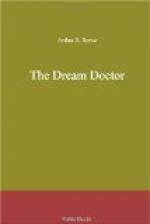Kennedy uncorked a bottle and the subtle odor of oranges mingled with ether stole through the room.
“Some one here will recognize that odour immediately. It is the new orange-essence vapour anesthetic, a mixture of essence of orange with ether and chloroform. The odour hidden by the orange which lingered in the laboratory, Mr. Winslow and Mr. Strong, was not isoprene, but really ether.
“I am letting some of the odour escape here because in this very laboratory it was that the thing took place, and it is one of the well-known principles of psychology that odours are powerfully suggestive. In this case the odour now must suggest the terrible scene of the other night to some one before me. More than that, I have to tell that person that the blood transfusion did not and could not save him. His illness is due to a condition that is incurable and cannot be altered by transfusion of new blood. That person is just as doomed to-day as he was before he committed—”
A figure was groping blindly about. The arsenic compounds with which his blood was surcharged had brought on one of the attacks of blindness to which users of the drug are subject. In his insane frenzy he was evidently reaching desperately for Kennedy himself. As he groped he limped painfully from the soreness of his wound.
“Dr. Harris,” accused Kennedy, avoiding the mad rush at himself, and speaking in a tone that thrilled us, “you are the man who sucked the blood of Cushing into your own veins and left him to die. But the state will never be able to exact from you the penalty of your crime. Nature will do that too soon for justice. Gentlemen, this is the murderer of Bradley Cushing, a maniac, a modern scientific vampire.”
I regarded the broken, doomed man with mingled pity and loathing, rather than with the usual feelings one has toward a criminal.
“Come,” said Craig. “The local authorities can take care of this case now.”
He paused just long enough for a word of comfort to the poor, broken-hearted girl. Both Winslow answered with a mute look of gratitude and despair. In fact, in the confusion we were only too glad to escape any more such mournful congratulations.
“Well,” Craig remarked, as we walked quickly down the street, “if we have to wait here for a train, I prefer to wait in the railroad station. I have done my part. Now my only interest is to get away before they either offer me a banquet or lynch me.”
Actually, I think he would have preferred the novelty of dealing with a lynching party, if he had had to choose between the two.
We caught a train soon, however, and fortunately it had a diner attached. Kennedy whiled away the time between courses by reading the graft exposures in the city.
As we rolled into the station late in the afternoon, he tossed aside the paper with an air of relief.
“Now for a quiet evening in the laboratory,” he exclaimed, almost gleefully.




